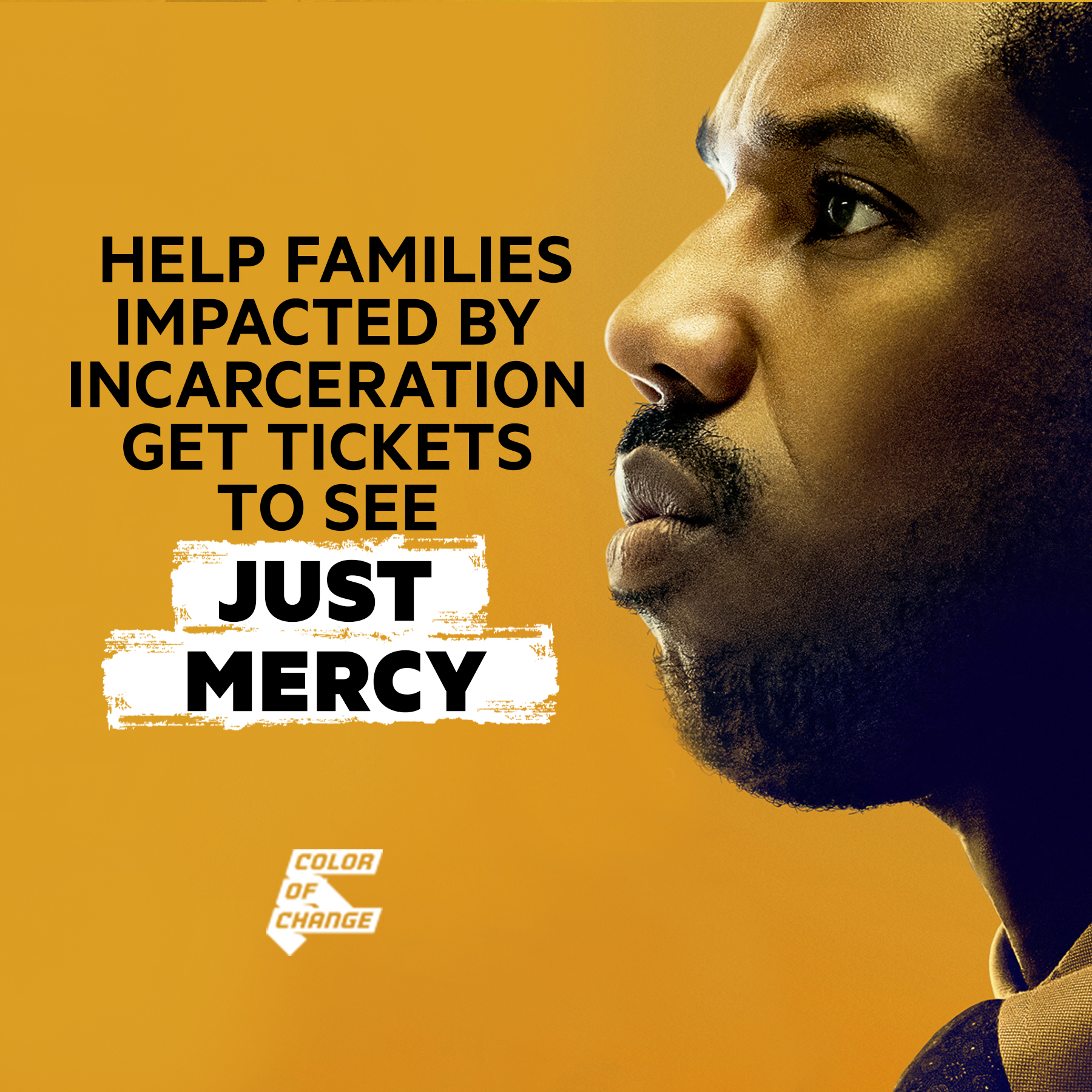"Just Mercy" provides a vital picture of the criminal justice system and our collective fight to end mass incarceration.
Support our effort end mass incarceration and we'll fund families to see "Just Mercy" in theaters.
Dear friend,
Just Mercy is a must-see. It hurts. It stings. But at the same time, it inspires a spirit of hope, determination, and resolve to keep fighting. Everyone should see it. But especially families who know firsthand the pain of incarceration and unjust family separation. Because keeping hope alive is how we make it, and how we keep up the necessary work for liberation. Will you chip in to make sure families directly impacted by incarceration can go see Just Mercy for free?
The film tells the story of Walter McMillian, a Black man living in Monroeville, Alabama who served six years on death row for a crime he didn’t commit. McMillian’s case is endemic to many of the issues in the criminal penal system. Eyewitness testimony that would’ve provided evidence of Mcmillian’s innocence was ignored and he was later convicted to a life sentence that was converted to the death penalty by an all-white jury. But this story is one of justice. “Just Mercy” is a movie that describes the journey of Bryan Stevenson, a young social justice lawyer at the time who fought against all odds and won McMillian’s freedom. The life and career of Bryan Stevenson show that we CAN push the system in the right direction and achieve true justice in our communities. This year, we're partnering with Warner Bros. because we want to make sure that families across the country have an opportunity to see “Just Mercy” on the big screen, but we need your help to make this a reality.
Stories that bring the issues of the criminal justice system to a national audience are crucial to our movement but we still have a lot of work to do before we end mass incarceration. The criminal penal system continues to target and terrorize Black people on a daily basis. One-third of Black men will face a felony conviction in their lifetime and Black people are almost 6 times more likely to be incarcerated than white or Latinx people.3 And Black women are the fastest-growing segment of the prison population in the United States -- making up 29 percent of the incarcerated population but only around 7 percent of the total population.4 Black families are being uprooted and once a person is convicted it’s almost impossible to return to normal life. A conviction prevents Black folks from job and housing opportunities and strips any hope of upward financial mobility. But with your help, we can fuel our movement to mitigate the impact of mass incarceration. And make sure that the lives and stories of our people can’t be ignored by political decision-makers and in the national conversation about criminal justice reform. We must continue to tell these stories of justice that end with the freedom of our people -- it keeps hope alive.
You can support our effort to end mass incarceration today and not only will we be one step closer to bringing real-life wins for Black folks in our communities, but we’ll also fund families to see “Just Mercy” in theaters.
Until justice is real,
Scott, Rashad, Arisha, Clarise, Erika, Malachi, Marybeth, Marena, Madison, Leonard, Tamar, Neosho, and the rest of the Color of Change team.
References :
- "‘Just Mercy,’ by Bryan Stevenson." The New York Times. https://act.colorofchange.org/go/224762?t=9&akid=40123%2E1942551%2Efw3vmA
- Ibid.
- Race & Justice News : One-Third of Black Men Have Felony Convictions. Sentencing Project. https://act.colorofchange.org/go/135460?t=11&akid=40123%2E1942551%2Efw3vmA
- ACLU. https://act.colorofchange.org/go/177837?t=13&akid=40123%2E1942551%2Efw3vmA

Color Of Change is building a movement to elevate the voices of Black folks and our allies, and win real social and political change. Help keep our movement strong.

Aucun commentaire:
Enregistrer un commentaire